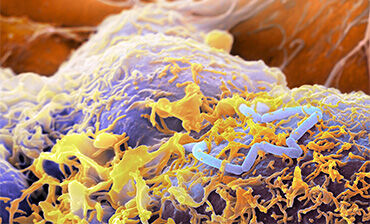Listeriosis

Listeriosis is a disease caused by Listeria monocytogenes. The disease primarily causes problems in pregnant women, newborns, and adults with a weakened immune system.
Listeria bacteria are ubiquitous in the environment, and food-borne outbreaks have been detected worldwide. Many animals carry the bacteria in their faeces. After exposure (via contaminated food) most healthy adults do not develop any symptoms, except in the case of pregnant women. After an incubation period of about three weeks pregnant women may suffer from a self-limiting influenza-like illness which may affect the uterus. In that case, it can lead to death of the foetus and consequent abortion or to a dramatic picture of congenital listeriosis in the newborn. In addition, listeriosis in adults with weakened immune system and the elderly may lead to meningitis, brain infection, and severe blood infection. All clinical presentations are treatable with prolonged courses of antibiotics, but the prognosis of the most serious ones is poor.
Control measures should be aimed at the farm and food-processing level, in order to prevent contamination of food products. Preventive measures include providing appropriate information for consumers on how to minimise the risk of ingesting food contaminated by Listeria.



